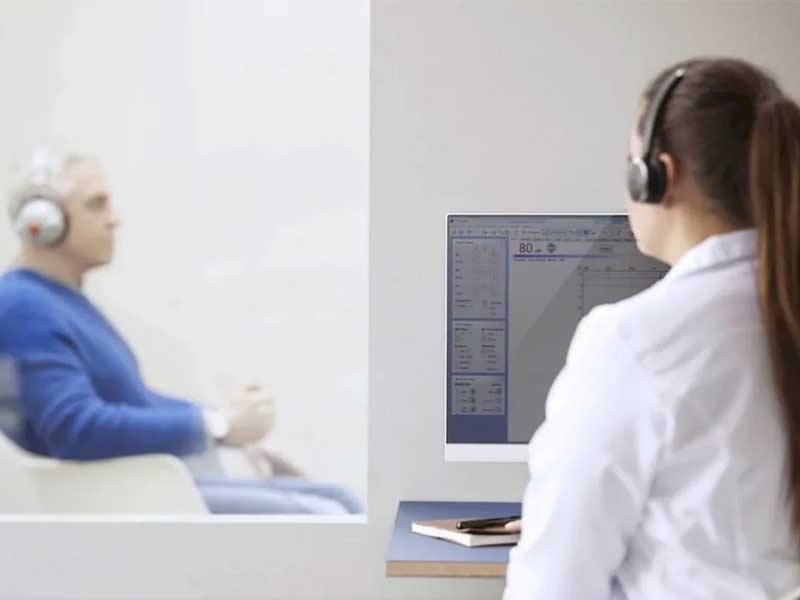
Audiometry
Audiometry is a non-invasive hearing test that measures a person's ability to hear different sounds, pitches, and frequencies. It is used to assess hearing loss, identify specific hearing issues, and determine the severity of hearing impairments. Audiometry tests are crucial for diagnosing hearing disorders and monitoring changes in hearing ability over time.
During the procedure, the patient is exposed to a variety of tones and speech through headphones, and they indicate when they can hear each sound. The results help audiologists create a profile of the patient's hearing capabilities, which is essential for recommending hearing aids or other treatments if needed.
Types of Audiometry Tests
Pure Tone Audiometry
Pure Tone Audiometry is the most common type of audiometric test. It evaluates the quietest sound a person can hear at different frequencies and pitches. During the test, the patient listens to a series of tones at varying volumes through headphones and presses a button or raises their hand when they hear each sound. The results are plotted on an audiogram, which provides a visual representation of the patient’s hearing thresholds across various frequencies.
This test is particularly useful for identifying hearing loss caused by damage to the inner ear or auditory nerves, known as sensorineural hearing loss. It is quick, non-invasive, and typically takes about 20 to 30 minutes to complete. The audiologist uses the results to assess the degree of hearing loss and may recommend hearing aids or other interventions based on the findings.
Speech Audiometry
Speech Audiometry measures a person’s ability to hear and understand speech rather than just pure tones. This test is performed by having the patient repeat words or sentences at different volumes while listening through headphones. The test evaluates both the speech reception threshold (SRT), which is the softest speech a person can understand, and speech discrimination, which measures how well they understand words at normal conversation levels.
Speech audiometry is particularly important for assessing how hearing loss impacts daily communication. It is often used in conjunction with pure tone audiometry to provide a complete picture of a person’s hearing abilities. The test helps audiologists determine whether hearing aids or other devices could improve the patient’s ability to understand speech.
Advantages of Audiometry
Audiometry offers several benefits for diagnosing and managing hearing health:
- Early detection of hearing issues: Audiometry tests can identify hearing loss early, allowing for timely intervention to prevent further damage and improve communication.
- Personalized treatment plans: The results of an audiometry test provide detailed information about a person’s hearing profile, enabling audiologists to recommend the most effective treatments, such as hearing aids or other assistive devices.
Audiometry tests are quick, painless, and highly accurate, with most sessions lasting between 20 and 30 minutes. The results are available immediately, allowing for prompt diagnosis and treatment planning.
Pre- and Post-exam Care
Pre-exam care: No special preparation is needed for an audiometry test. Patients should avoid exposure to loud noises before the exam to ensure accurate results. It is important to inform the audiologist of any recent ear infections or earwax build-up, as these conditions can affect hearing and may need to be addressed before the test.
Post-exam care: After the test, patients can resume normal activities immediately. If hearing loss is detected, the audiologist will discuss treatment options, which may include hearing aids, lifestyle adjustments, or further medical evaluation if necessary.
Frequently Asked Questions (FAQ)
1. How long does an audiometry test take?
An audiometry test typically takes about 20 to 30 minutes, depending on the specific tests performed.
2. Is the audiometry test painful?
No, the test is completely painless and non-invasive. It simply involves listening to sounds and responding when they are heard.
3. What happens if hearing loss is detected?
If hearing loss is identified, the audiologist will recommend appropriate treatment options, such as hearing aids or other assistive devices, and may suggest follow-up testing to monitor your hearing over time.
Audiometry Services at Clinic Consultation
At Clinic Consultation, we provide comprehensive audiometry testing to assess your hearing health and detect any potential issues. Our skilled audiologists use state-of-the-art equipment to ensure accurate results and personalized treatment recommendations.
Book an appointment today to schedule your audiometry test at Clinic Consultation and take the first step toward better hearing health.
Click the button below to schedule your appointment online.